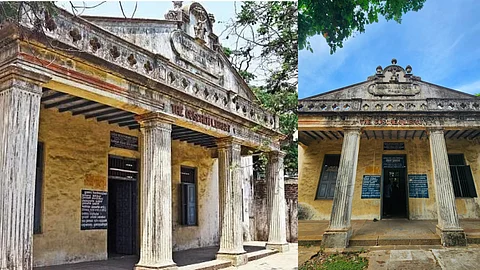
- HOMEGROWN WORLD
- #HGCREATORS
- #HGEXPLORE
- #HGVOICES
- #HGSHOP
- CAREERS
- ABOUT US
- CONTACT US

It is becoming increasingly common to witness classified heritage buildings in dire need of restoration, and the Goschen Library in Chennai is no exception. Situated in the heart of the city, this 96-year-old library, with its quaint charm and light yellow paint, has a fascinating history that is now fading behind fallen window panes, a dilapidated structure, and a non-functioning restroom. Despite its current state, the Goschen Library has a remarkable past as one of Chennai's oldest libraries.
Once a thriving centre for public gatherings, the Goschen Library's grand hall witnessed numerous nationalist meetings in its heyday. The library boasted an impressive collection of Tamil and English books across various genres, complemented by a regular supply of newspapers and daily magazines. The reading room, known for its serene atmosphere, has remained a constant aspect of this broken yet revered structure.
The Goschen Library, constructed in 1927, reflects the classical style favoured by the British, adorned in an elegant shade of yellow. Before delving into its history, it is crucial to understand the context that led to its establishment.
In the 1880s, the demand for reading rooms was growing among the public, yet access to books remained limited. The turning point came in 1925 when the Corporation of Madras made a landmark decision, mandating the establishment of a reading room in every district of the city. The Goschen Library was initially conceived as a public hall and library by Shri Vijayaraghavulu Chetty, with the intention to foster a culture of reading among local residents. Additionally, the hall doubled as a venue for nationalist meetings and other public gatherings. Subsequently, the library was named after Lady Goschen, the wife of then Governor of Madras, Lord Goschen.
In its prime, the library housed an impressive collection of over 15,000 books. Today, like many other public libraries, it mainly serves as a quiet spot for people to read newspapers, although, we can't be sure of how many out of those 15,000 books remain.
Over the years, the Goschen Library transitioned from a mere reading space to a focal point of community engagement. In 1940, plans were drawn to transform the building into a machinery museum, considering the industries and factories coming up in Madras at the time. The idea was to introduce local students to mechanics and machinery, but sadly, this vision was never realized, and the library gradually fell into decline.
Adding to the library's plight, the devastating 2015 floods in Chennai inflicted severe damage, leading to the loss of numerous books and further deterioration of the old public hall-turned-library.
However, in an interesting turn of events, the Goschen Library has recently garnered significant attention through the work of a Tamil novelist, Prabha. In his newly published book, titled 'Kosalai', the library takes centre stage as a beloved childhood spot for the author, who grew up in Chintadripet. Since the book's release, it has ignited a renewed interest and discourse regarding the restoration of this historic building. Ironically, despite its spotlight in the novel, visitors to the library have been left disappointed, as there are no copies of the book available in the library.
The Goschen Library's heritage building reflects a glorious past, but its current state reveals the urgent need for restoration. The heritage building's plight is evident, with its lack of proper facilities, the urgent need for functional installations, and layers of paint coating. Nevertheless, its charm and allure from the past can still be revived.
As one of the symbols of Chennai's cultural heritage, preserving the library becomes essential. With the public's demand for action growing, there's a sense of hope that the responsible authorities will take the initiative to rennovate this iconic structure. By doing so, we can safeguard our heritage and create a space where reading culture can thrive for generations to come.
If you enjoyed this piece we recommend you check out:
Eloor Libraries: Inside A Kochi Mainstay That Stays True To Its Old-World Essence
The Old School Charm Of Mumbai’s Last Few DVD Libraries
A Guide To 20 Of India's Most Unique Libraries For Every Kind Of Book-Lover
